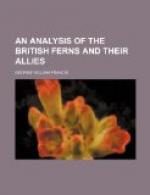|
This section contains 526 words (approx. 2 pages at 300 words per page) |

|
"Fern": An Analysis
"Here is the fern's frond, unfurling a gesture, like a conductor whose music will now be pause." In the opening lines of this poem, Ted Hughes uses sparse, almost simplistic word choices, to convey his deep and underlying meaning in his poem, "The Fern." This same style of writing is continued throughout the poem. His choice of diction, tone, and mood, all work together, to portray the true message of man being an insignificant and insubstantial creation in comparison to nature, which is everlasting.
Through Hughes's use of diction, he very effectively conveys his meaning. Hughes's skillful use of diction is shown, in words such as "one note of silence", or "earth dances gravely." These words show that the poem is much graver than it appears at first glance. This is further proved with the next stanza. "Mouse's ear unfurls its trust", "spider takes up her bequest...
|
This section contains 526 words (approx. 2 pages at 300 words per page) |

|


